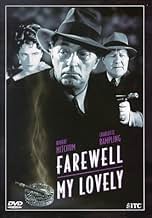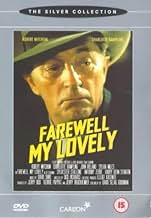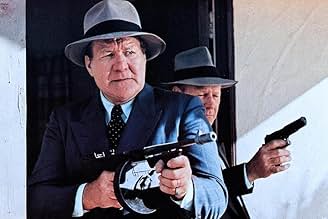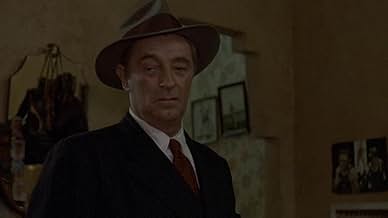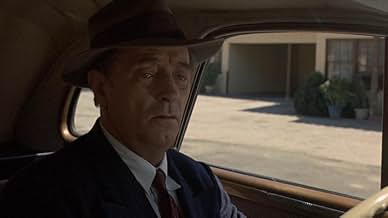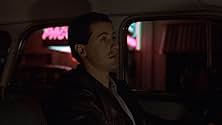AVALIAÇÃO DA IMDb
7,0/10
10 mil
SUA AVALIAÇÃO
O detetive particular de Los Angeles Philip Marlowe é contratado pelo condenado em liberdade condicional, Moose Malloy, para encontrar sua namorada Velma, ex-dançarina de boates decadentes.O detetive particular de Los Angeles Philip Marlowe é contratado pelo condenado em liberdade condicional, Moose Malloy, para encontrar sua namorada Velma, ex-dançarina de boates decadentes.O detetive particular de Los Angeles Philip Marlowe é contratado pelo condenado em liberdade condicional, Moose Malloy, para encontrar sua namorada Velma, ex-dançarina de boates decadentes.
- Direção
- Roteiristas
- Artistas
- Indicado a 1 Oscar
- 1 vitória e 3 indicações no total
Jimmy Archer
- Georgie
- (as Jimmie Archer)
- Direção
- Roteiristas
- Elenco e equipe completos
- Produção, bilheteria e muito mais no IMDbPro
Avaliações em destaque
The choice of Mitchum for the lead role really did work. The novel suggest a tired Marlowe, who has had enough of being "detective to the stars". He wants to get out of his seedy little life, and change things, but instead, he gets wrapped up in another case. Mitchum's hang dog expression and tired wise guy act sums up the depression of the fallen hero. This is not the smooth talking Bogart, not the finely clipped and smooth Powell, but a harder, more experienced Marlowe, a man more aware of his own downfall. As he says to knulty, what he need is a nights sleep, what he needs is another drink. After watching this truly excellent recreation of late forties LA, I'm not sure that I couldn't agree with him.
Ah yes, and Charlotte Rampling and the sometime Thelma really was "cuter than lace pants"
Ah yes, and Charlotte Rampling and the sometime Thelma really was "cuter than lace pants"
In the wake of 'The Long Goodbye' and, especially, 'Chinatown', there was a profusion in the mid- to late-70s of recreated films noirs of the Chandlerian bent, many featuring aging stars. 'Farewell My Lovely' is one of the best - while it does not reek of the depravity of Dmytryk's 1944 version, starring Dick Powell, it is broader in scope, and truer to a kind of lived-in realism, as opposed to hard-boiled iconography. It's nice to see 1940s L.A. close to what it might have looked like, and not the vague dreamworlds presented by classic noir. it would be a mistake to assume that this is a progressive, or revisionist movie - while it scores well in its treatment of race, the fundamental misogyny of Chandler's source novel and Dmytryk's film lingers. Indeed, it is less palatable, in that 40s Hollywood made its villainesses glamorous, charismatic and desirable; Charlotte Rampling seems barely to exist on screen, a mere assemblage of corruption and cold amorality.
The hard-boiled detective fictions of Dashiell Hammett and Raymond Chandler were created in conscious opposition to the reactionary puzzles of the English Golden Age (eg Agatha Christie), which were exercises in asserting order and social control. Chandler tried to express a bleaker reality, one where arbitrary violence and corruption is not so easily contained, where smaller crimes may be solved, but society itself is rotten, diseased, irredeemable. Chandler pits his hero Philip Marlowe against this malaise, tough, solitary, misanthropic, frequently compared to medieval knights, as hopelessly out of his time as Don Quixote.
Chandler's novels are completely filtered through the prejudiced narration of Marlowe, so instead of realism we get a barely controlled expressionism, riddled with ideology. Marlowe is unable to trust anyone, and defines himself against everyone else, the Other, especially women and blacks. This is a subtext in the novel, but RIchards foregrounds it in the early scenes of this film. When Marlowe enters a black neighbourhood investigating Velma, he is very uncomfortable in an alien environment. Although, as a detective, he has the freedom to navigate the city, to access both poor black neighbourhoods and obscenely wealthy white mansions in a way neither one of these nor the other can, he is still constrained by ideology, the ideology of his times - he is not as apart from the corruption as he thinks. And so we frequently see him indoors, even imprisoned, by cops and criminals alike - like a conservative, everything is connected for Marlowe, except everything stinks.
This making mental states physical is important for a narrative seen through its hero's head. It puts us on our guard, distances us from Marlowe in a way Chandler never lets us, allows us to be more critical. Another device is the bizarre use of narrative voiceover. This seems conventional enough, Marlowe telling us the story, controlling, interpreting, often verbatim from the book. But his voiceover is broken - he starts addressing us, then, within that, he tells Nulty a story; so that the viewer is at two removes from a story that we only have it's teller's word for its veracity. In its modest way, the film DOES have revisionist aspirations.
Unlike Altman's film, 'Farewell' is purely enjoyable on the level of a murder-mystery thriller - the plot is satisfyingly, Chandlerianly (sic?) opaque; there are sufficient interesting supporting characters; the violence seems quaintly 1940s; the music is exciting. The film, therefore, would be pleasant, but harmless, except for one crucial element: Robert Mitchum, America's greatest actor. His aging Marlowe might be more appropriate to 'The Long Goodbye', but this is an astonishing portrait of middle- giving on to old-age, a study of a man struggling with cynicism, trying to maintain order (wisecracks; narration; frequent references to baseball, a game with rules) and humanity (the kid) in a world that only offers diabolic inversions of each.
Even more resonantly, the film is a film about film noir, about acting, about Robert Mitchum, soon to become famous in the period represented, soon the embodiment of the doomed noir hero. The Chandlerian dialogue that works wonderfully on the page can seem corny and stilted when spoken, but Mitchum pulls it off with melancholy beauty. He is the only screen Marlowe that seems like an actual human being who has lived - not even Bogie quite managed that.
The hard-boiled detective fictions of Dashiell Hammett and Raymond Chandler were created in conscious opposition to the reactionary puzzles of the English Golden Age (eg Agatha Christie), which were exercises in asserting order and social control. Chandler tried to express a bleaker reality, one where arbitrary violence and corruption is not so easily contained, where smaller crimes may be solved, but society itself is rotten, diseased, irredeemable. Chandler pits his hero Philip Marlowe against this malaise, tough, solitary, misanthropic, frequently compared to medieval knights, as hopelessly out of his time as Don Quixote.
Chandler's novels are completely filtered through the prejudiced narration of Marlowe, so instead of realism we get a barely controlled expressionism, riddled with ideology. Marlowe is unable to trust anyone, and defines himself against everyone else, the Other, especially women and blacks. This is a subtext in the novel, but RIchards foregrounds it in the early scenes of this film. When Marlowe enters a black neighbourhood investigating Velma, he is very uncomfortable in an alien environment. Although, as a detective, he has the freedom to navigate the city, to access both poor black neighbourhoods and obscenely wealthy white mansions in a way neither one of these nor the other can, he is still constrained by ideology, the ideology of his times - he is not as apart from the corruption as he thinks. And so we frequently see him indoors, even imprisoned, by cops and criminals alike - like a conservative, everything is connected for Marlowe, except everything stinks.
This making mental states physical is important for a narrative seen through its hero's head. It puts us on our guard, distances us from Marlowe in a way Chandler never lets us, allows us to be more critical. Another device is the bizarre use of narrative voiceover. This seems conventional enough, Marlowe telling us the story, controlling, interpreting, often verbatim from the book. But his voiceover is broken - he starts addressing us, then, within that, he tells Nulty a story; so that the viewer is at two removes from a story that we only have it's teller's word for its veracity. In its modest way, the film DOES have revisionist aspirations.
Unlike Altman's film, 'Farewell' is purely enjoyable on the level of a murder-mystery thriller - the plot is satisfyingly, Chandlerianly (sic?) opaque; there are sufficient interesting supporting characters; the violence seems quaintly 1940s; the music is exciting. The film, therefore, would be pleasant, but harmless, except for one crucial element: Robert Mitchum, America's greatest actor. His aging Marlowe might be more appropriate to 'The Long Goodbye', but this is an astonishing portrait of middle- giving on to old-age, a study of a man struggling with cynicism, trying to maintain order (wisecracks; narration; frequent references to baseball, a game with rules) and humanity (the kid) in a world that only offers diabolic inversions of each.
Even more resonantly, the film is a film about film noir, about acting, about Robert Mitchum, soon to become famous in the period represented, soon the embodiment of the doomed noir hero. The Chandlerian dialogue that works wonderfully on the page can seem corny and stilted when spoken, but Mitchum pulls it off with melancholy beauty. He is the only screen Marlowe that seems like an actual human being who has lived - not even Bogie quite managed that.
The work of Raymond Chandler experienced a resurgence in the 1970s, thanks to Robert Altman's 'The Long Goodbye (1973)' and Roman Polanski's very Chandler-ish 'Chinatown (1974).' The waning career of Robert Mitchum was also revived by two Chandler adaptations, 'Farewell, My Lovely (1975)' {previously filmed by Edward Dmytryk as 'Murder, My Sweet (1944)'} and 'The Big Sleep (1978) {previously filmed by Howard Hawks}. Though outside the traditionally-accepted film noir period (approx. 1940-1958), the 1970s provided an ideal climate for a resurgence of the style. The demise of the Production Code in the 1960s had allowed filmmakers the freedom to explore more explicit themes, usually implying an increase in language, violence and nudity. Chandler's novels – which typically dabbled in themes of prostitution, homosexuality and pornography – could now be adapted faithfully without the threat of censorship, though fortunately, in the case of this particular film, director Dick Richards doesn't overdo the sleaze. The source material is one of the few Marlowe novels I haven't read, but 'Farewell, My Lovely' nevertheless seems a loyal interpretation of the author's style.
Philip Marlowe is the sort of role that Robert Mitchum would have nailed in the 1950s, when he always seemed to feel old and weary without actually looking it. Nevertheless – though he lacks the cocky vigour of Dick Powell, or the invincibility of Humphrey Bogart – the aging Mitchum does communicate what is perhaps Marlowe's most defining characteristic: that of a disillusioned, world-weary private dick looking for something in this world, anything, worth fighting for. In his latest case, Marlowe is hired by fearless lug Moose Malloy (Jack O'Halloran) to find his girlfriend Velma, who vanished while Malloy was serving a prison sentence. As always, what had initially seemed a straightforward assignment soon gets Marlowe embroiled in a complex patchwork of deceits, murders and double-crossings. Crucial to the mystery is Charlotte Rampling (emulating Lauren Bacall) as the adulterous wife of an old millionaire, and Oscar-nominated Sylvia Myles as an alcoholic performance artist. Also look out for small roles from Harry Dean Stanton as Det. Rolfe, and Sylvester Stallone as a lustful thug.
'Farewell, My Lovely' does a fine job of translating Chandler's pessimistic vision of urban decay and human depravity. The 1940s adaptations are, of course, superbly entertaining, but most of them – particularly 'The Big Sleep (1946)' and 'Lady in the Lake (1947)' – are clearly filmed on a pristine studio set, somewhat offsetting the grittiness of Chandler's characters and plot. Richards' film, to his credit, is incredibly ugly. Aside from Helen Grayle, whose sprawling mansion suffers next to Buckingham Palace, most of Marlowe's witnesses live in appalling squalor; even his own office is drab and bathed in shadow. Yet, despite the unpolished milieu, 'Farewell, My Lovely' most assuredly has a heart. Marlowe's wordless interactions with the son of a penniless musician help us see beneath the detective's front of indifference, hinting at his admiration for the honest working-class, and his fervent distaste towards the decadence of the wealthy. When offered his own wealth, Marlowe unthinkingly surrenders it to someone he deems more worthy, a touching but cheerless ending to a film steeped in the unpleasantness of human existence.
Philip Marlowe is the sort of role that Robert Mitchum would have nailed in the 1950s, when he always seemed to feel old and weary without actually looking it. Nevertheless – though he lacks the cocky vigour of Dick Powell, or the invincibility of Humphrey Bogart – the aging Mitchum does communicate what is perhaps Marlowe's most defining characteristic: that of a disillusioned, world-weary private dick looking for something in this world, anything, worth fighting for. In his latest case, Marlowe is hired by fearless lug Moose Malloy (Jack O'Halloran) to find his girlfriend Velma, who vanished while Malloy was serving a prison sentence. As always, what had initially seemed a straightforward assignment soon gets Marlowe embroiled in a complex patchwork of deceits, murders and double-crossings. Crucial to the mystery is Charlotte Rampling (emulating Lauren Bacall) as the adulterous wife of an old millionaire, and Oscar-nominated Sylvia Myles as an alcoholic performance artist. Also look out for small roles from Harry Dean Stanton as Det. Rolfe, and Sylvester Stallone as a lustful thug.
'Farewell, My Lovely' does a fine job of translating Chandler's pessimistic vision of urban decay and human depravity. The 1940s adaptations are, of course, superbly entertaining, but most of them – particularly 'The Big Sleep (1946)' and 'Lady in the Lake (1947)' – are clearly filmed on a pristine studio set, somewhat offsetting the grittiness of Chandler's characters and plot. Richards' film, to his credit, is incredibly ugly. Aside from Helen Grayle, whose sprawling mansion suffers next to Buckingham Palace, most of Marlowe's witnesses live in appalling squalor; even his own office is drab and bathed in shadow. Yet, despite the unpolished milieu, 'Farewell, My Lovely' most assuredly has a heart. Marlowe's wordless interactions with the son of a penniless musician help us see beneath the detective's front of indifference, hinting at his admiration for the honest working-class, and his fervent distaste towards the decadence of the wealthy. When offered his own wealth, Marlowe unthinkingly surrenders it to someone he deems more worthy, a touching but cheerless ending to a film steeped in the unpleasantness of human existence.
Stylish remake of the much-filmed Chandler classic. Was Mitchum too old for the rolethat was the rap at the time. In hindsight, I don't think so, especially when he has that persuasive moment about aging near film's end. He certainly looks like he's climbed too many stairs and closed too many bars, but then that creates an unusual amount of pathos that deepens the role. Still and all, the passionate clinches with a sleek young Charlotte Rampling are borderline at best.
This is one of the few successful neo-noirs in my little book. Director Dick Richards and crew manage a funky look just right for the hard-boiled atmosphere of 40's detective fiction. Marlowe (Mitchum) drifts from one seedy venue to the next in his search for the mysterious Velma. But true to Chandler's slice-of-life LA, there's also a glimpse of the high- and-mighty in a Beverly Hills palace worthy of royalty. In fact, Marlowe resembles something of a pilgrim loner navigating greater LA in search of an elusive truth even after he's forgotten why.
Mitchum, of course, lowkeys all the way, hardly changing expression whether being roughed up by Moose Malloy or nuzzling up to Helen Grayle (Rampling). It has to be one of the more downbeat performances in private eye annals. But my Oscar goes to Sylvia Miles as the ultimate blowzy drunk (Florian). Her house is a mess, her hair is a mess, and her robe never quite fits in revealing ways Marlowe refuses to pick up on. Still and all, a fling with her looks more promising than an interlude with that plastic mannequin Marlowe does cozy up with. At the same time, Jack O'Halloran as the Moose comes across as the kind of pitiable dumb ox who would sacrifice everything for a faithless woman. In fact, the movie boils down oddly to something of a Samson and Delilah update.
But not everything is upside. The dialogue occasionally gets a little too cute, while the DiMaggio running thread seems forced at times. Nonetheless, it's a worthy version of the popular novel, and I'm just sorry that director Dick Richards hasn't been more active in the production end of the business. Judging from this film and the under-rated Culpepper Cattle Company, he certainly has the talent. And when an expressionless Marlowe comes to part with his money at movie's end, we finally glimpse that remote inner terrain and the heart of Chandler's heartless world.
This is one of the few successful neo-noirs in my little book. Director Dick Richards and crew manage a funky look just right for the hard-boiled atmosphere of 40's detective fiction. Marlowe (Mitchum) drifts from one seedy venue to the next in his search for the mysterious Velma. But true to Chandler's slice-of-life LA, there's also a glimpse of the high- and-mighty in a Beverly Hills palace worthy of royalty. In fact, Marlowe resembles something of a pilgrim loner navigating greater LA in search of an elusive truth even after he's forgotten why.
Mitchum, of course, lowkeys all the way, hardly changing expression whether being roughed up by Moose Malloy or nuzzling up to Helen Grayle (Rampling). It has to be one of the more downbeat performances in private eye annals. But my Oscar goes to Sylvia Miles as the ultimate blowzy drunk (Florian). Her house is a mess, her hair is a mess, and her robe never quite fits in revealing ways Marlowe refuses to pick up on. Still and all, a fling with her looks more promising than an interlude with that plastic mannequin Marlowe does cozy up with. At the same time, Jack O'Halloran as the Moose comes across as the kind of pitiable dumb ox who would sacrifice everything for a faithless woman. In fact, the movie boils down oddly to something of a Samson and Delilah update.
But not everything is upside. The dialogue occasionally gets a little too cute, while the DiMaggio running thread seems forced at times. Nonetheless, it's a worthy version of the popular novel, and I'm just sorry that director Dick Richards hasn't been more active in the production end of the business. Judging from this film and the under-rated Culpepper Cattle Company, he certainly has the talent. And when an expressionless Marlowe comes to part with his money at movie's end, we finally glimpse that remote inner terrain and the heart of Chandler's heartless world.
L.A. of June 1941 as it was depicted in the Raymond Chandler's novel of the same title is filled with the dark secrets of the past that better stay uncovered. Philip Marlow, PE (Robert Mitcum) takes a job to find a vanished girlfriend of the felon Moose Malloy, and he has no idea what will follow. As Marlow searches for Velma Galento, he has to deal with a beautiful but cold and calculating seductress (Charlotte Rampling - young, sensual and dangerous), a jealous corrupt detective (Stanton), an old alcoholic girlfriend (Sylvia Miles in one of her two Oscar nominated performances, second - the shortest in the history of Oscars, for "Midnight Cowboy"), and a buffed thug (Sylvester Stallone -- it was fun to see him before he became a star of Rocky and Rambo).
This adaptation of Raymond Chandler novel features action, suspense, humor, mystery and Robert Mitchum in one of his best performances as a man struggling with cynicism, hatred, and betrayal.
This adaptation of Raymond Chandler novel features action, suspense, humor, mystery and Robert Mitchum in one of his best performances as a man struggling with cynicism, hatred, and betrayal.
Você sabia?
- CuriosidadesIn the novel, Philip Marlowe was in his 30s. Robert Mitchum, who plays him in this film, was 57.
- Erros de gravaçãoWhen Marlowe (Robert Mitchum) drives up to Mrs. Grayle's home (Charlotte Rampling), the front entrance is obviously double doors but when the butler is shown opening it from the inside, it is clearly a single door.
- Citações
Philip Marlowe: [voiceover] The house itself wasn't much. It was smaller than Buckingham Palace and probably had fewer windows than the Chrysler building.
- ConexõesFeatured in Proini peripolos (1987)
- Trilhas sonorasI've Heard That Song Before
Words and Music by Jule Styne and Sammy Cahn
Sung in the dance hall at the opening.
Principais escolhas
Faça login para avaliar e ver a lista de recomendações personalizadas
- How long is Farewell, My Lovely?Fornecido pela Alexa
Detalhes
- Data de lançamento
- País de origem
- Idioma
- Também conhecido como
- Adeus, Querida!
- Locações de filme
- Empresas de produção
- Consulte mais créditos da empresa na IMDbPro
Bilheteria
- Orçamento
- US$ 2.500.000 (estimativa)
Contribua para esta página
Sugerir uma alteração ou adicionar conteúdo ausente


